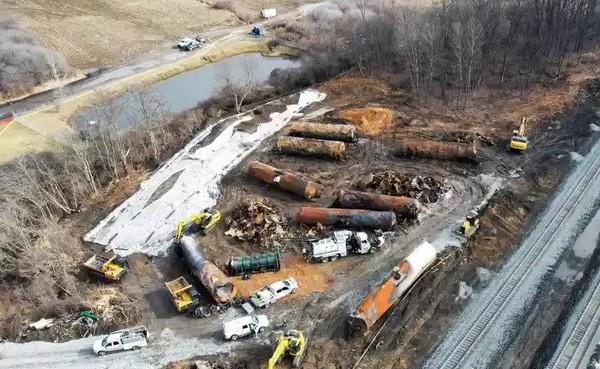On February 3, a freight train operated by Norfolk Southern derailed in East Palestine, Ohio, US. 11 rail cars were carrying high-hazard chemicals, including vinyl chloride, a known cause of respiratory issues and, in extreme cases, cancer. The Ohio train derailment signifies something beyond a simple one-off incident; it is a repercussion of deeply rooted moral hazards in our society.

The derailment immediately stirred residents’ apprehension about potential chemical hazards, including the pollution of the air and water supply that residents depend on. The responses by Norfolk Southern, the Environmental Protection Agency, and other related entities were prompt. Within three days of residents evacuating the region, Norfolk Southern carried out a controlled burn on five rail cars carrying flammable vinyl chloride, which could explode if not incapacitated in time.
Despite the confirmation by government officials that East Palestine is safe once again, concerns among residents remained. Some experienced rashes and chest pains and reported deaths of animals, including thousands of fish and livestock. Norfolk Southern set up a 1 million USD fund for the affected community to fund clean-ups, reimburse damaged infrastructure and compensate residents who were forced to leave their homes for at least five days. Nevertheless, this is only temporary relief, as they will continue to suffer protracted difficulties like losses of income and health issues.
More importantly, the present solutions do not tackle the fundamental cause that underpins the incident. The first National Transportation Safety Board report of the accident revealed that an overheated wheel bearing went undetected by most sensors until it was too late for the crew to brake the train. If sensors were installed at closer gaps, the crew would have been alerted much before the temperature rose over the threshold. Despite this being the cause of multiple derailments, including those of two other Norfolk Southern trains in 2022, rail companies have the freedom to decide how they implement and manage sensors. If this issue is not directly addressed, similar preventable incidents will recur, making communities near railroads scapegoats for society’s negligence.
Looking ahead, we need a promise that rail companies will continue spending money and committing effort to guarantee that the 2023 Ohio Train Derailment becomes the last incident of its kind. The starting point should be centralizing railroad regulations. Rather than leaving decisions solely up to the companies, the government should impose strict measures on how many heat detectors should be placed at which distance, as well as how often their safety will be assessed. A permanent increase in the operating workforce is also essential. At present, understaffing is forcing workers to work long hours under intense schedules without leaves, leaving many railroad facilities without regular and meticulous inspections. With more railroad workers stationed, maintenance measures would be adhered to with care.
The train derailment in Ohio may have struck Norfolk Southern; its stocks dropped by 10% over the past month, and the company is forced to deal with further legal consequences. Still, this doesn’t change the fact that Norfolk Southern is a gigantic corporation that Americans rely on for the operation of over 30,000 kilometers of railway or that it stably earns 10 billion USD every year. A daily fine of 70,000 USD, which is less than 0.001% of their annual revenue, is way too affordable for Norfolk Southern to be deterred from saving money at the expense of safety. The same goes for any other company in other industries. If it costs more to keep conscience than to neglect it, companies tilt towards the latter as their goal is to gain more profit. Unfortunately, society has deemed their selfish deduction reasonable and even understandable.
150 Norfolk Southern rail cars are not the only things that went off track — so did the morality of companies, individuals, and society. Like how toxic phenol leaks from chemical plants contaminated the drinking water of 2 million South Koreans in 1991 or how the improper construction of Surfside condominium contributed to the death of 100 people in 2021, disasters owing to the immoderate focus on cutting industrial costs do not bind themselves to a particular time or region. If society continues to condone this, it will inevitably see more trains crashing, more buildings collapsing, and more people dying. To avert further tragedies, let us return to zero and hold dear to our moral compass.

